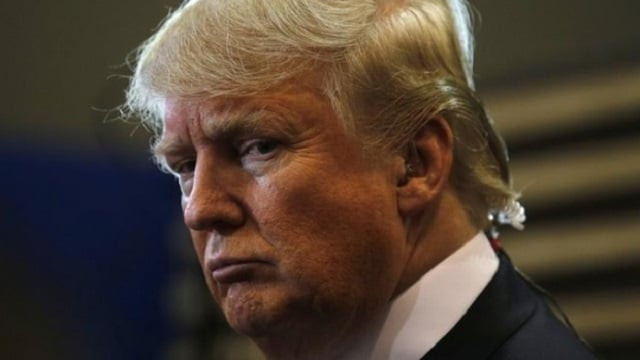Implications of Trump’s diatribe
Viewed strategically, Trump's threat means little more than tit-for-tat reaction

US President Donald Trump. PHOTO: REUTERS
What else can this threat mean for Pakistan? That is the major question for most stakeholders in South and South-West Asia who analysed his speech. Can a list be drawn up to realistically prognosticate the series of negative impacts the verbal diatribe can have on Pakistan?
US anti-Pakistan rhetoric amid realities of CPEC
To begin with, I see suspension of the aid from US triggering most of the heavyweights in the financial, industrial and technological spheres going firm in dealings Pakistan in light of American hostility.
Decision-makers in these sectors who have already suspended cooperation with Pakistan under pressure from different institutions operating under the umbrella of US and United Nations will be more careful. Those still cooperating might rethink and that would be the actual beginning of a worrisome phase.
Once that happens, we will realise that Trump really did mean business and that US’s hostility towards Pakistan can trigger a series of disasters in the financial, industrial and technological sectors of Pakistan. On the contrary, people dealing with issues related to political economy, public finance and micro-level activity will not jump the gun. They will allow themselves to assess whether Pakistan is facing a real threat of economic sanctions. Those who have a habit of viewing US-Pak hostility through a political and strategic lens might consider Trump’s threat merely a tit-for-tat reaction.
This week will be crucial in revisiting Pak-US relations purely in terms of economics if one has an intention to deal with political issues from the financial, industrial and technological aspects.
It is an inescapable modern reality that economic strength offers the chance to take independent decisions in political, strategic and military spheres and not vice versa.
Does Pakistan have a tradition of intellectual-political brainstorming to follow this principle strictly? Count me on the side of pessimists when answering this question. But face the reality boldly, which is pretty patriotic and not otherwise.
Should Pakistan take a hostile plunge facing the threat of economic sanctions? Will the US threat of suspending aid to forex-starved Pakistan initiate a chain reaction which damages our exports and foreign exchange reserves even further?
If the answer is no, stay happy in your hibernation. But if the answer is yes, think for a moment about two strategies: one, getting Pakistan out of this fix; two, turning this country into a financially, strategically and politically strong country that can avoid being in such a fix ever again.
Trump’s Afghan strategy doomed to fail, says PM Abbasi
Now, it is up to the political, strategic and public-finance managers of Pakistan to chart out these strategies in the practically and pragmatically. One can only hope that the Pak-US relations are either revisited or else, Pakistan is made into a stronger state that does not grow worry to the arteries when facing such a threat.
It is not that important to analyse whether Trump means business when he issues such a threat. The more important question is: how did the US issue a threat of such magnitude to a country that claims to be a front-state in the fight against terrorism?
Why did Islamabad not think of protecting its honour when Pakistan faced the initial threat of terrorism way back in 1980s? Why did our decision-makers allow an aid-seeking Pakistan to fall in a trap when they were warned by experienced politicians and intellectuals?
Even the wisest answers to these questions will not help Pakistan though. The only thing that might help Pakistan would be redesigning its economic-political-strategic spheres with a plan of achieving financial-economic strength. That is what is missing from the system and that is what renders Pakistan vulnerable.
Any student of history or political economy can confirm that plummeting exports, shortfalls in revenue collections, dwindling forex reserves and threat of sanctions by a superpower can send a chill down the spine even of regional and global giants.
Modern states thrive on economic, strategic and political strength that is gained through years of nation-building. Vulnerabilities of this magnitude are inescapable when a country is 70-years old and has never overcome such situations with dignity.
This article might sound like a sermon from an observer worried about the threats his country is facing. But it is not. It is meant to nudge a hibernating lot of confused decision-makers who cannot tackle challenges head-on.
The writer has worked with major newspapers and specialises in the analysis of public finance and geo-economics of terrorism
Published in The Express Tribune, August 28th, 2017.
Like Business on Facebook, follow @TribuneBiz on Twitter to stay informed and join in the conversation.


















COMMENTS
Comments are moderated and generally will be posted if they are on-topic and not abusive.
For more information, please see our Comments FAQ